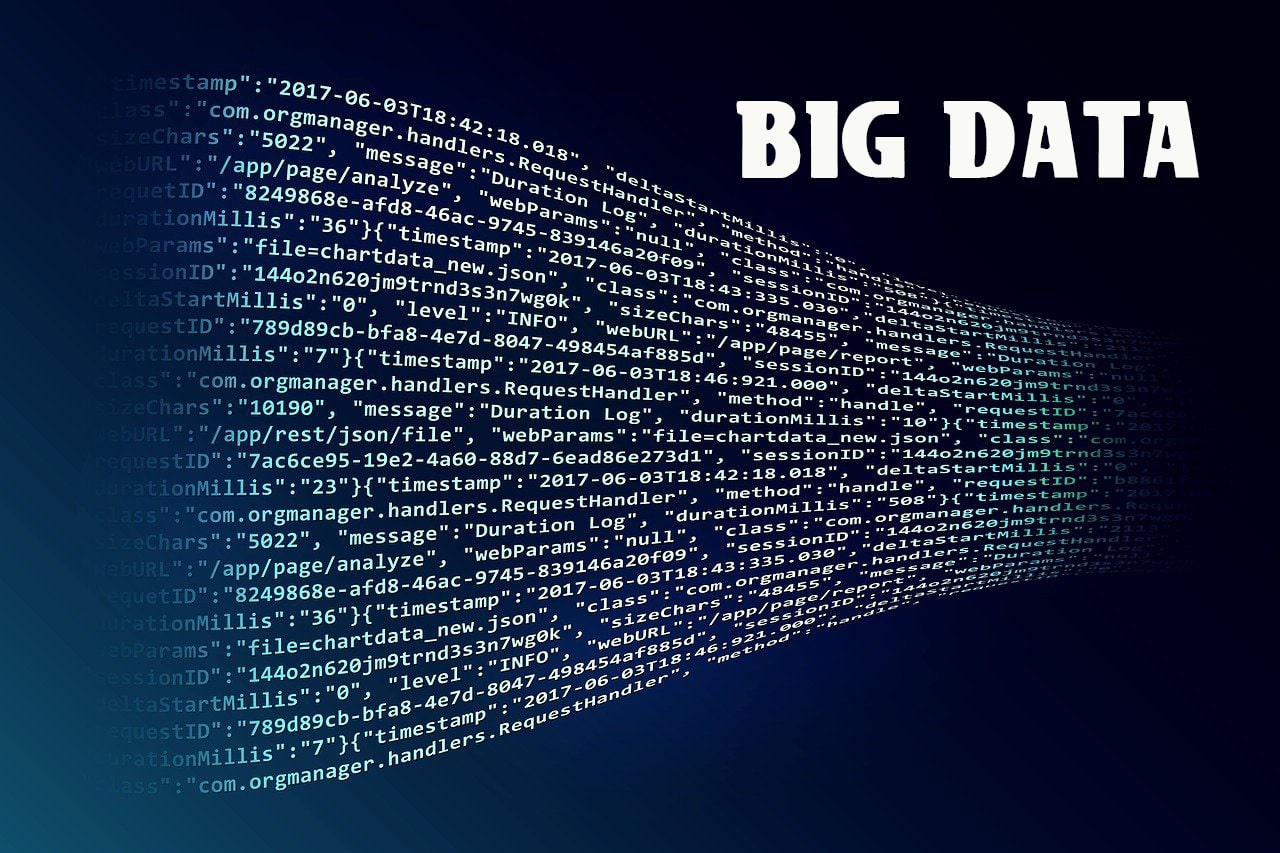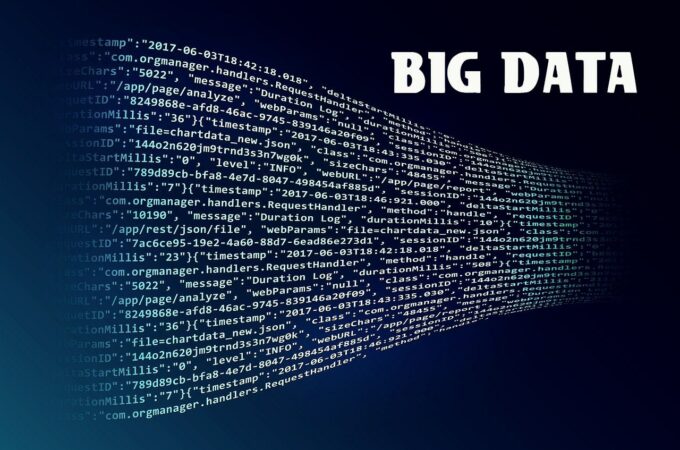Big Data excites as much as it scares. What are the advantages and disadvantages of Big Data? What are the issues and risks to be resolved to serenely enjoy all its benefits? Focus on the Big Data revolution.
The evolutions of Big Data, in 2023 I wrote:

Every minute, worldwide, more than 204 million emails are sent. Every minute, Google registers 2 million different requests on its search engine and Facebook, as many “likes”. Every minute, $85,000 worth of orders are placed on Amazon.
Already, new players have appeared but above all, the volume of data produced just turns heads. Big Data has become even bigger than big. The challenges and risks of Big Data have exploded.
Every minute, there are no longer 2 million searches on Google but almost 4. Every minute, 4.5 million videos are watched on YouTube and more than 40 million messages are sent on Whatsapp and Messenger.
What is Big Data: the simple definition
No, Big Data is not the new sandwich from McDo or the hero of the latest Pixar.
Who has never heard of data today? These data, these statistics, this information reflecting everything that happens on the internet?
The development of the Internet and social media contribute to the multiplication of data produced on the Internet. New analysis tools appear.
A myth is that the volume of data produced is multiplied by 2 each year.
Big Data is the generic term designated to translate the exceptional volume, the “big” volume of data produced on the Internet. Big Data affects all areas: marketing, science, customer relations, transport, health, education etc… in short, absolutely everyone!
A wind of revolution is blowing behind everyone’s back. Stronger than the wind, it’s a hurricane called Big Data! Unfortunately, too few are still prepared for it.
To properly understand the Big Data revolution, it is necessary to understand the issues and the risks. It is important to understand how it works to measure the advantages and disadvantages of Big Data.
Big Data is also at the root of one of the major issues of this century: confidentiality and respect for privacy. It is Big Data that gave rise to the famous GDPR.
Exploit the potential of Big Data thanks to the Inbound Marketing strategy:
Why are we talking about Big Data?
The interest of Big Data is to be able to take advantage of new data produced by all players – companies, individuals, scientists and public institutions – with the aim of optimizing its commercial offer, its services, developing research and development but also to create jobs.
There are here the advantages but also the disadvantages of Big Data.
Indeed, Big Data, like any self-respecting digital development, is a source of new needs and therefore of new professions. We have seen Data Analyst profiles appear in recent years.
To understand the importance of the volume of data produced every second on the internet, I suggest you watch this fairly well-known video, listing everything that happens on the web in 60 seconds:
This volume is all the more important since the expansion of mobile Internet. Now, we are all connected, 24 hours a day, 7 days a week. We are therefore likely to constantly produce and receive digital data.
Moreover, the recent growth of connected objects which will lead to the new web 3.0 during the 2023s, will only accentuate the importance of Big Data and its challenges.
The cloud also has a large share of responsibility in the Big Data revolution, making data storage easy and inexpensive.
Understand the challenges and risks of Big Data with the 5Vs
Why are we no longer talking about Data but Big Data? What are the advantages and disadvantages of Big Data? The risks and the challenges? To fully understand this revolution, here are its 5V:
- V, for Volume: Big Data is therefore an exceptional volume of data
- V, for Speed: Big Data is fast, real-time data processing
- V, for Variety: Big Data is varied data, taking different forms. Thus, an image, a video, a tweet, a like are data. A simple trace left on a website following your visit, the famous cookies, or by one of your connected objects are data.
- V, for Veracity: Big Data poses the problem of data veracity. Are they relevant, are they real? Remember the case of the fake tweet that led to the fall of a share price on the Nasdaq.
- V, for Values: One of the drawbacks of Big Data is the problem of knowing what added values these data bring. Data sorting is essential. It is essential to carefully select the data to be analyzed, according to its activity and especially its objectives.
The advantages of Big Data: a wealth of opportunities
Information is the lethal weapon of the 21st century. Whoever has the information has the power.
This is what all the geopolitical experts and all the economists keep telling us. Big Data is now the biggest source.
- Big Data, to optimize its offer : it allows a complete analysis of consumer behavior and expectations. Google Analytics, for example, allows you to optimize your website through real-time analysis of related data: number of visits, browsing behavior, bounce rate, number of pages read, click rate, etc.
Big Data allows the optimization of an e-commerce store, train timetables and even school programs. With the analysis of the behavior of Internet users following the MooCs (online courses), it is indeed possible to analyze the interest of the courses and their content.
- Big Data, to anticipate needs and demand: Big Data is at the source of remarketing, this practice aimed at displaying advertisements to you based on your browsing. Have you looked at the cameras on the Fnac site and you find camera banners on all the sites you visit? It’s an advantage of Big Data (some would say it’s more of a disadvantage…!)
Target, in the United States, uses Big Data to predict the upcoming delivery of pregnant women. How ? By analyzing their purchasing behavior. Pregnant women buy fragrance-free creams around 3 months of pregnancy and then food supplements. This is also Big Data.
In New York, Big Data makes it possible to predict fires. The University of Michigan has developed a big data analysis to prevent crimes. Does the machine in Person of Interest speak to you? Here we are !
- Big Data, to optimize its logistics and organization: it allows, for example, to monitor its sales in real time and therefore to optimize its inventory management. Amazon even regularly tests intuitive delivery features, aiming to offer delivery to order.
These examples are ultimately only a handful of the opportunities that Big Data will offer.
Companies, and not only, will have to show imagination, organization and a huge sense of analysis to take full measure of the phenomenon.
From this mastery will come new uses that will upset our way of conceiving the Internet.
But Big Data is not just about advantages. It’s also downsides…
The disadvantages of Big Data: a mass of risks
By analyzing the issues, you can easily understand the risks of Big Data.
Not a day goes by without a new digital espionage scandal breaking out. Facebook, the NSA… Companies and institutions are regularly accused of exploiting Big Data for controversial purposes.
The evolution of Big Data naturally raises the question of data protection and privacy.
This is the biggest drawback of Big Data and the biggest challenge we face.
Respect for privacy is framed, in a very relative way, by the “Informatique et Libertés” law of 1995.
In particular, it says that personal data must be collected for a very specific, explicit and above all legitimate purpose. It stipulates that the data retention period must not exceed the achievement of this objective.
In addition, the individual, the Internet user, also benefits from the right to be informed of the collection of data concerning him.
This data protection legislation has been supplemented by the GDPR.
However, Google and GAFAM are regularly criticized for not taking these laws into account.
When the UFC-Que Choisir reproaches the misuse of Big Data to the giants Google, Facebook and Twitter
Recently, the UFC-Que Choisir took Google, Facebook and Twitter to court because of general conditions of use deemed abusive by the consumer defense association, mainly in terms of personal data.
UFC-Que Choisir would have listed 180 abusive clauses.
The association notably criticizes the 3 web giants for illegible and inaccessible terms of use, partly in English. It also criticizes them for keeping the data collected despite the achievement of the objective for which they were collected.
Google, Facebook and Twitter, meanwhile, hide behind a so-called “internationalization” of the terms of use.
Another disadvantage of Big Data: the security of data storage
The cloud is undoubtedly one of the major inventions of recent years, the one that made the Big Data phenomenon possible. However, is the security of the data stored there really ensured?
Cloud providers, mostly American, are used to creating ” back doors ” allowing them to access the data they store at any time.
They therefore theoretically have access to your photos, your texts but also to public data, stored by institutions and government.
Additionally, the Patriot Act stemming from the September 11 attacks grants the US government full access to data stored in the cloud. This is what makes Big Data a significant risk.
These flaws clearly pose the problem of respect for individual freedoms.
If you watch Person of Interest, a series oriented around a machine collecting all the digital data to be able to predict crimes, you will therefore understand why the hero attaches great importance to keeping this machine secret and inaccessible.
This series is quite interesting to understand the challenges and risks of Big Data.
The benefits of Big Data for businesses
After all that, it’s pretty easy to identify big data opportunities for businesses.
With the mass of data produced, Big Data makes it possible to:
- Improve its customer experience;
- Understand the expectations and behaviors of its customers and prospects;
- Optimize its Digital Marketing strategy ;
The company now has a lot of data to refine the targeting of its marketing campaigns, optimize its advertising campaigns and understand the buying journey of customers.
This data allows the company to send the right message to the right person, at the right time and in the right place.
However, Big Data is a significant challenge:
62% of Marketing professionals say they are sometimes drowned out by the mass of data generated with Big Data.
Yet Big Data has a stronger advantage for larger companies.
The challenge of Big Data: limiting unfair competition between large groups and small businesses
This is one of the huge disadvantages of Big Data: Big Data benefits larger companies more.
The big companies – and especially the GAFAMs – produce more data than any more traditional company.
As a result, these large companies benefit from an enormous competitive advantage over start-ups and VSEs/SMEs.
The challenge here is huge. How to limit this unfair competition and allow all companies to benefit from the advantages of Big Data?
Answers in a few years
__
In conclusion, the number of digital data continues to grow and Big Data is still in its infancy. Analysis and storage tools will continue to improve.
It is difficult today to predict precisely the impact that Big Data will have on our lives and our economy, however, there is no doubt that we are witnessing a real revolution which undoubtedly marks the end of private life as we know it. let’s hear…

0 Comments